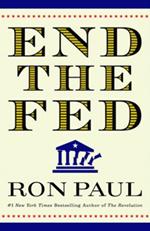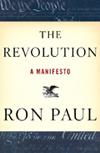Monetary Policy and The State of the Economy hearing before the Committee on Financial Services, U.S. House of Representatives, July 16, 2008
 Dr. PAUL. I ask unanimous consent to submit a written statement at this time.
Dr. PAUL. I ask unanimous consent to submit a written statement at this time.
The CHAIRMAN. Without objection, it is so ordered.
Dr. PAUL. Thank you, Mr. Chairman.
The CHAIRMAN. The Federal Reserve doesn’t get to object.
Dr. PAUL. I think everybody recognizes today that our financial markets are in a big mess, and I have complained for many years about the Federal Reserve System. But I would have to say that Chairman Bernanke himself is not responsible for this mess. Not that I think he has the answers in this deeply flawed monetary system, but obviously the seeds of this mess have been planted over a long period of time. It is more a reflection of the system rather than that of one individual. It is amazing how panicky people have been getting, and how everybody is wringing their hands, and yet our government tells us, well, there is no recession, so things must be all right. A lot of people are very angry. Yet we know there is something seriously wrong, with all the mess that we have in the financial markets. And now we see this morning that inflation is roaring back, yet it is still way below what the private economists are saying about what inflation is really doing. But the consumer knows all about it. It seems like around here, whether it is from Treasury or the Federal Reserve or even in the Congress, all we need now is to have a world-class regulator that is going to solve all our problems, and I think that is so simplistic. From my viewpoint, what we need is a world-class dollar, a dollar that is sound, not a dollar that continues to depreciate, and not a system where we perpetually just resort to inflation and deficit financing to bail out everybody. This is what we have been doing. It hasn’t been just with this crisis, but an ongoing crisis. We have been able to pull ourselves out of these nosedives quite frequently. One of the worst with the dollar was in 1979. We patched it together. I think the handwriting on the wall is there is a limit to how many times we can bail the dollar out, because conditions are so much worse today than they have ever been. We talk a lot about predatory lending, but I see the predatory lending coming from the Federal Reserve. Interest at 1 percent, overnight rates, loaning to banks, encouraging the banks and investors to do the wrong things causes all the malinvestment. These conditions were predictable. They were predicted by the Austrian free market economists. It should surprise nobody, yet nobody resorts to looking to those individuals who are absolutely right about what was coming and what we should have done. Even as early as 7 years ago, I introduced legislation that would have removed the line of credit to the Treasury, which was encouraging the moral hazard and the malinvestment. Here, it looks like now we are going to need $300 billion of new appropriations. So we need to look at the monetary system and its basic fundamental flaws that exist there, and then we might get to the bottom of these problems we are facing today.
[break]
The CHAIRMAN. The gentleman from Texas, who may not be quite so lucky in getting the answer that he wants.
Dr. PAUL. Thank you, Mr. Chairman. I want to address the subject of the inflation being actually a tax. Today, most of us who go home and talk to our constituents hear a major complaint, and that is the rising cost of living, especially the cost of gasoline, medical care, food, and education. Most economists from all fields, whether they are monetarists or Keynesians, they generally recognize that inflation is a monetary phenomenon. But it is interesting that once we get rising prices, very few people talk about the real source and the cause of the inflation, and they go to saying, well, it’s the oil companies. They charge too much. That is inflation. Labor makes too much money, and it is a labor problem. Others just say, well, it’s just pure speculation, if we didn’t have the speculators, we wouldn’t have the inflation. Yet, most people conclude not that we have too much money, but that we don’t have enough. If we only had more money, we could pay all these bills, which I think is absolutely the wrong conclusion. What we need is more value in the money. In terms of gold and other commodities, prices aren’t really going up. Sometimes they actually even go down. In terms of paper money worldwide, whether the euro or the dollar, the prices are going up. But I maintain really that inflation is a tax. If the Federal Reserve and you as Chairman have this authority to increase the money supply arbitrarily, you are probably the biggest taxer in the country. You are a bigger taxer than the Congress, because they are talking now about a bailout package of $300 billion, and we will have to raise the national debt to accommodate to take care of the housing crisis. But you as the Federal Reserve Chairman and the Federal Reserve Board and the system create hundreds of billions of dollars without even the appropriations process. Then this money gets circulated, and some people benefit — the people who get to use it first benefit, and the people who get to use it last suffer the consequence of the higher prices. So every time people go and complain about these higher prices, they should say to themselves, I am paying a tax. Because whether you are monetizing debt or whatever or catching up for buying up securities, we have had a free ride for all these years. We have been able to export our inflation. We have the Chinese buying up our securities. We haven’t had to monetize it. But now it is coming home, and you have to buy these things to prop them up. So I maintain that inflation, as the increase in the supply of money for various reasons is a tax, it is an unfair tax, it is a regressive tax, it hurts the poor, it hurts the retired people more because labor never goes up and keeps up with inflation. We never keep up with the need for retired individuals to keep up with the cost of living. So I would like you to comment on this. Is this completely off base, or is there something really to this? Every time we see the cost of living going up, we indirectly are paying a tax.
 Mr. BERNANKE. Congressman, I couldn’t agree with you more that inflation is a tax and that inflation is currently too high, and it is a top priority of the Federal Reserve to run a policy that is going to bring inflation to an acceptable level consistent with price stability as we go forward. I would make one distinction, which is that what the Federal Reserve can control is the increase in prices on the average, over the overall basket of consumer goods and services. The enormous jumps in oil prices and other commodity prices are to some extent at least due to real factors out of the control of the Federal Reserve. The Federal Reserve cannot create another barrel of oil. It is the global supply and demand conditions which are affecting those particulars things to the most significant extent, but to the extent that the Fed does have influence on the overall inflation rate, you are absolutely right that it is very important to maintain price stability, and I take that very seriously.
Mr. BERNANKE. Congressman, I couldn’t agree with you more that inflation is a tax and that inflation is currently too high, and it is a top priority of the Federal Reserve to run a policy that is going to bring inflation to an acceptable level consistent with price stability as we go forward. I would make one distinction, which is that what the Federal Reserve can control is the increase in prices on the average, over the overall basket of consumer goods and services. The enormous jumps in oil prices and other commodity prices are to some extent at least due to real factors out of the control of the Federal Reserve. The Federal Reserve cannot create another barrel of oil. It is the global supply and demand conditions which are affecting those particulars things to the most significant extent, but to the extent that the Fed does have influence on the overall inflation rate, you are absolutely right that it is very important to maintain price stability, and I take that very seriously.
Dr. PAUL. But if the oil prices were going up for another reason other than monetary reasons, other prices would have to come down because there would be a limit in the money supply. I think — and the prices are going up today, like I indicated in my opening statement, not necessarily because of the monetary policy of the last year but maybe for the last 15 or 20 years and the fact that we were able to export, so to speak, our inflation. Now it is coming home. Those people who have been holding these dollars are not wanting to buy them as readily. Fortunately, foreign central banks are still not dumping them but even the other central banks might not be as cooperative. So I still see tremendous pressure. I don’t see any signs that you are able to do very much because all we hear about is more inflation. You know, it is not so much that they are too big to fail. It just means that everybody needs to be propped up. Congress participates in it. And all the pressure is put on the dollar. It is a dollar bubble. And I think what we are seeing is the unraveling of a dollar bubble that had been building for more than 35 years.
Dr. Ron Paul is a Republican member of Congress from Texas.











